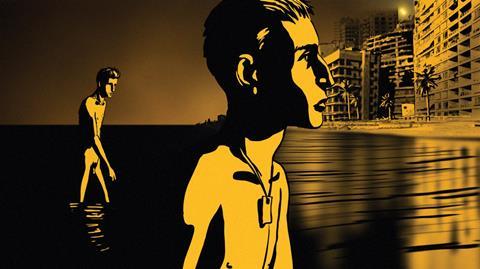Dir: Ari Folman.Israel-Germany-France.2008. 87mins.

Ari Folman’s animated documentary could easily turn out to be one of the most powerful statements of this Cannes and will leave its mark forever on the ethics of war films in general. Dealing from a very personal point of view with the Israeli incursion into the Lebanon in 1982 and culminating with the Sabra and Shatila refugee camp massacre, which the Israelis did not perpetrate but surely tolerated, this is not only a tremendously potent anti-war movie but also a formidable moral indictment of Israeli conduct at that time.
Replacing actual footage with animated images lends the picture a uniqueness that might have been lost otherwise, given the enormous amount of similar footage generated daily. Although there are no new elements of that terrible event revealed here for the first time, the context in which they are put is sufficient to deliver a fearful wallop. Already selling briskly and at high prices, it should, in all likelihood, feature next week on the awards rostrum. Commercially, it seems likely to secure an aggressive US deal and is an obvious candidate for an Oscar nomination in the animated category. It will benefit greatly from positive notices and generous coverage wherever it opens.
Triggered by the nightmares of a friend, chased in his dreams by 26 rabid dogs - ghosts of the dogs he shot in Lebanon during the war - the director himself starts to realise that he has pushed his own memories of that war to his subconscious. He starts to interview people who served there with him, trying to flesh out the brief images in his head. As he talks to various old comrades, including one who has been living in the Netherlands for the last 20 years, his memory starts to kick in. The pointlessness of war, the frenzy of destruction, the arbitrary dealing of life and death on both sides, seems to suggest for a while that Folman, like many of his predecessors, prefers not to refer directly to the Middle East conflict but rather focus on the horror of war as such.
But as he comes to deal with the profound sense of guilt of those who have survived, the viewer gets the first indication of the atrocious shadow of the Holocaust that is to become a major motive. The last part, which tackles frontally the massacre itself, features Ron Ben Ishai, one of the best-known Israeli war correspondents at the time, re-enforcing all the rest of the testimonies and driving the film directly into the heart of the matter. The film reverts back to normal authentic documentary footage for the closing sequence, delivering the ultimate punch to drive its message home
At Sabra and Shatila, Christian phalangists broke into the refugee camps and ferociously massacred women, children and old people still left there in revenge for the murder of their leader, Bashir Gumayel. But the Israeli forces stood nearby and took no action, in fact sent flares instead to illuminate the night sky and assist the murderers in their task. This had the tacit approval of then-Defence Minister Ariel Sharon, who orchestrated the Lebanon operation and once the truth emerged was forced to resign from his post.
The wider political context of the war is not mentioned here, whether it was a lame attempt to establish a democratic government in Lebanon or deal a deadly blow to the terrorist organisations residing there. Folman takes it all far more personally, and so will his audience. War is a disaster on any terms. But still, he argues, even in the midst of this atrocity there is a moral standard to be upheld - otherwise, whatever we pretend to be, we’re no better than all the other murderers around us.
Shot as a straightforward documentary and then splendidly reinvented on the drawing board by David Polonsky and animated by Yoni Goodman, the film’s muscular visual style requires initial adjustment. But once its dark, precise nature settles in, the viewer is sucked in. The terrifying dogs of the opening sequence, the dying horses at the Beirut hippodrome, the head of a dead girl emerging from the rabble, these are only a few of the film’s haunting images. Max Richter’s soundtrack, mixing beat music with Bach, Chopin and Schubert, provides strong support and Nili Feller’s editing uses every single one of the film’s 87 minutes for best effect.
Production companies
Bridgit Folman Film Gang
Les Films d’Ici
Razor Films
Arte France
ITVS International
Worldwide distribution
Match Factory
(49) 221 539709-0
Producers
Ari Folman
Yael Nahlieli
Serge Lalou
Gerhard Meixner
Roman Paul
Screenplay
Ari Folman
Art director and illustrator
David Polonsky
Director of animation
Yoni Goodman
Editing
Nili Feller
Visual effects
Ro’i Nitzan
Music
Max Richter
Sound design
Aviv Aldema







![The Brightest SunScreen[Courtesy HKIFF]](https://d1nslcd7m2225b.cloudfront.net/Pictures/274x183/3/5/0/1448350_thebrightestsunscreencourtesyhkiff_312678.jpg)














No comments yet